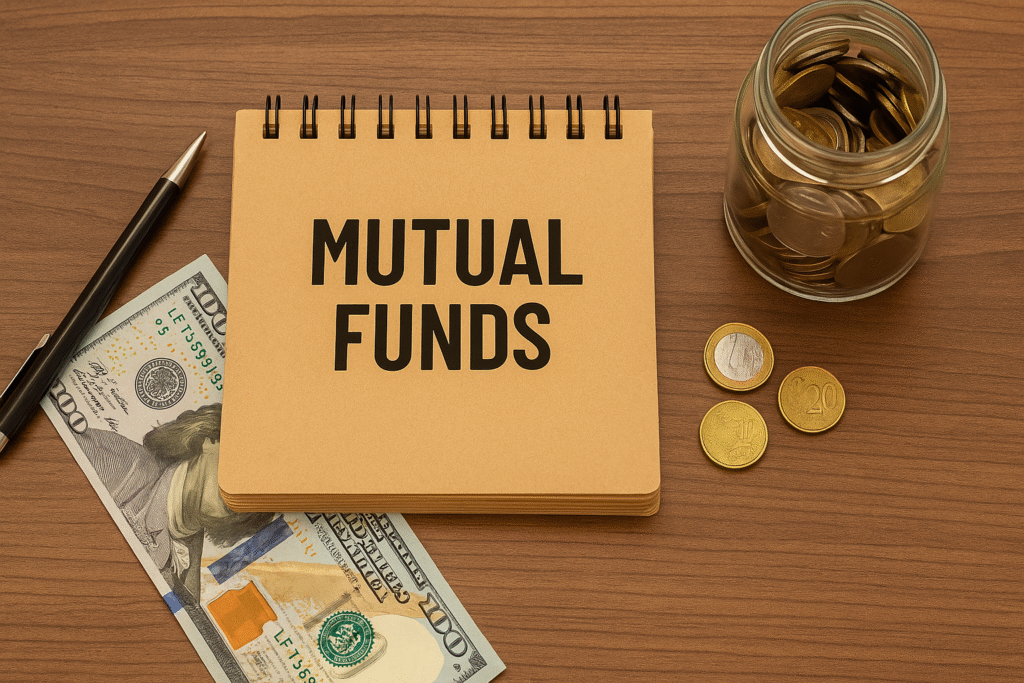“Should I invest in a fixed deposit or try my luck with mutual funds?” If you’ve ever asked yourself this question, you’re not alone. It’s one of the most common dilemmas faced by millions of Indian savers and investors. Lets have a look at mutual fund vs fixed deposit in detail.

For decades, fixed deposits (FDs) were the default choice for anyone looking to grow their money safely. But in recent years, mutual funds have gained popularity, especially among younger investors who are comfortable taking a bit of risk for potentially higher returns.
This guide will help you decide between the two. We’ll compare FDs and mutual funds across various parameters like risk, returns, taxation, liquidity, and more. Whether you’re a first-time investor or someone looking to rebalance your portfolio, this article is designed to give you clear, practical insights.
Let’s dive into the debate: Mutual fund vs fixed deposit — and find out which one truly deserves your money in 2025.
What is a Fixed Deposit (FD)?
Think of a fixed deposit as a financial locker. You deposit a fixed sum for a fixed time, and in return, the bank promises a fixed interest rate. It’s predictable, safe, and ideal for conservative investors.


Key Features of Fixed Deposits:
- Capital Safety: Your money is secure. Most bank FDs are insured up to ₹5 lakh.
- Fixed Returns: Interest rates typically range from 5.5% to 7.5% in 2025.
- Flexible Tenures: Anywhere from 7 days to 10 years.
- Low Liquidity: Breaking an FD before maturity usually incurs a penalty.
- Taxation: Interest income is added to your taxable income and taxed as per your slab.
FDs are best suited for:
- Retired individuals looking for stable income.
- Investors with short-term goals and low risk tolerance.
- Anyone looking for assured returns.
What is a Mutual Fund?
Now imagine pooling your money with thousands of others to invest in a basket of stocks, bonds, or both. This pool is managed by experts. That, in a nutshell, is a mutual fund.

Types of Mutual Funds:
- Equity Funds: Invest in stocks. Higher risk, higher return.
- Debt Funds: Invest in bonds and government securities. Lower risk, steady returns.
- Hybrid Funds: Mix of both equity and debt.
- ELSS Funds: Equity Linked Saving Schemes offering tax benefits under Section 80C.
Why Consider Mutual Funds?
- Higher Return Potential: Especially over the long term.
- Diversification: Your risk is spread across multiple assets.
- Accessibility: SIPs start from as low as ₹100.
- Liquidity: Open-ended funds allow you to redeem anytime (except ELSS).
Mutual funds are ideal for:
- Young professionals aiming to build wealth.
- Investors with long-term goals like retirement or children’s education.
- Those comfortable with market fluctuations.
Key Differences Between Fixed Deposits and Mutual Funds
Let’s break down the difference between fixed deposit and mutual fund in a simple, easy-to-understand table:
| Feature | Fixed Deposit (FD) | Mutual Fund |
| Returns | Fixed (5.5–7.5%) | Market-linked (can go 6–15% or more) |
| Risk | Very Low | Varies by type (low to high) |
| Liquidity | Moderate (penalty for early withdrawal) | High (except for lock-in funds) |
| Taxation | Fully taxable interest | STCG/LTCG depending on holding period |
| Inflation Hedge | Poor | Good (especially equity funds) |
| Capital Guarantee | Yes | No |
| Minimum Investment | ₹1,000+ | As low as ₹100 via SIP |
In summary, FDs offer safety and predictability. Mutual funds offer potential growth and wealth creation.
Mutual Fund vs Fixed Deposit: Risk and Return
Fixed Deposits: Safe but Limited
With FDs, your returns are guaranteed. But there’s a catch. If inflation is running at 6% and your FD earns 6.5%, your real return is only 0.5% before tax. Post-tax, you may even have negative real returns.
Mutual Funds: Volatile but Rewarding
Yes, mutual funds are market-linked, and that can be scary. But history shows that good mutual funds have outperformed FDs over the long term investments.
Example:
- FD: ₹1,00,000 at 7% for 5 years → ₹1,40,255
- Equity MF: ₹1,00,000 at 12% CAGR for 5 years → ₹1,76,234
The key is to stay invested and choose funds wisely.
Taxation: Mutual Fund vs Fixed Deposit
Let’s decode the tax aspect, which plays a big role in your actual earnings.
FD Taxation:
- Interest is fully taxable.
- No indexation or capital gain treatment
Mutual Fund Taxation:
Equity Funds:
- STCG (<1 year): 15%
- LTCG (>1 year): 10% on gains above ₹1 lakh
Debt Funds:
- STCG (<3 years): As per income slab
- LTCG (>3 years): 20% with indexation benefit (till 2023; check latest rules)
Mutual funds are more tax-efficient than FDs, especially for long-term investors.
Which is Better: FD or Mutual Fund?
Here’s how to decide based on different needs:
Go for FDs if:
- You cannot afford to lose any capital.
- You need fixed income.
- You are investing for less than 1 year.
Choose Mutual Funds if:
- You want to build wealth.
- You have long-term goals.
- You can handle market ups and downs.
There’s no universal answer to “which is better FD or mutual fund” — the best choice depends on you.
Real-Life Scenarios
Ramesh (Age 28):
- Goal: Buy a house in 10 years.
- Suggestion: Start SIP in equity mutual funds.
Priya (Age 45):
- Goal: Child’s college in 4 years.
- Suggestion: Invest in hybrid funds or conservative debt funds.
Sunita (Age 60):
- Goal: Monthly income post-retirement.
- Suggestion: Invest in senior citizen FDs or low-risk debt mutual funds with SWP.
This shows how age, goals, and risk tolerance shape the decision.
Top Mutual Funds to Invest in India (2025)
Here are some popular and consistent performers:
| Category | Fund Name | 5-Year CAGR* |
| Large Cap | Axis Bluechip Fund | ~13% |
| Flexi Cap | Parag Parikh Flexi Cap Fund | ~14% |
| ELSS | Mirae Asset Tax Saver | ~13% |
| Hybrid | HDFC Balanced Advantage | ~11% |
| Debt | ICICI Prudential Corporate Bond | ~7% |
*Past performance is not a guarantee of future returns. Choose funds based on your goal, risk appetite, and horizon.
Final Verdict: Which is Best — Fixed Deposit or Mutual Fund?
If your priority is capital safety and steady returns, FDs are great. But if you’re aiming for wealth creation, mutual funds are your best bet.
A mix of both is often ideal:
- Use FDs for short-term safety.
- Use mutual funds for long-term g rowth.
You don’t have to choose one over the other. You just have to choose wisely.
Yes, for long-term investing and beating inflation.
Yes, in the short term. But long-term investments in quality funds tend to recover and grow.
Mutual funds (ELSS) offer tax-saving with higher return potential compared to 5-year tax-saving FDs.
FDs are safer but offer lower returns.
FDs, but low-risk debt funds can also be considered.
Not necessarily. Diversify between FDs and mutual funds based on your goals.
The choice between mutual fund vs fixed deposit is not a battle — it’s a balance. Both have their pros and cons. The smart investor isn’t the one who picks a side, but the one who understands how to use both effectively. Remember, your money deserves more than just safety. It deserves growth. Choose accordingly

